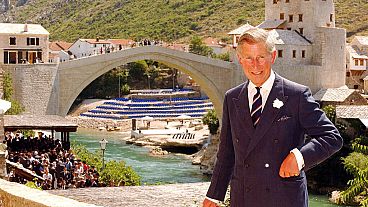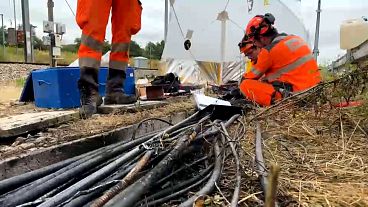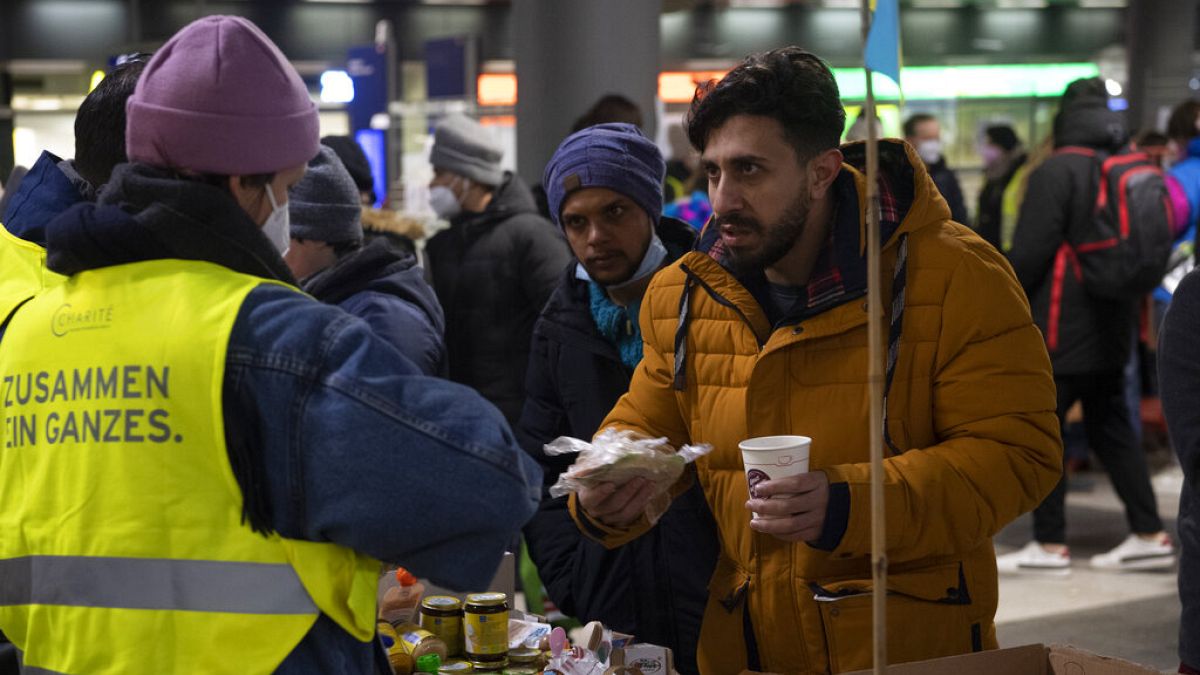Eneko Landaburo was the EU top negotiator of the first wave of enlargement in 2004, when Cyprus, Malta, the Czech Republic, Estonia, Hungary, Latvia, Lithuania, Poland, Slovakia and Slovenia joined the bloc. He says Europe needs to careful before opening its books again.
Russia's invasion of Ukraine has prompted both Ukraine and Georgia to ask for fast-track accession to the EU.
Eneko Landaburo was the EU top negotiator of the first wave of enlargement in 2004, when Cyprus, Malta, the Czech Republic, Estonia, Hungary, Latvia, Lithuania, Poland, Slovakia and Slovenia joined the bloc.
He explained to Euronews that while there may be a good deal of support for Ukraine joining the EU due to the ongoing Russian ssault on the country, enlargement is not a simple process.
The Copenhagen Criteria, he explained, require that new members fulfill strict criteria and can functions as a solid and viable democracy. "It is not just about political will and resources," he said.
Below, Landaburo answers Euronews' questions about enlargement and where the EU is on it right now.
What are the Copenhagen Criteria?
The candidate countries need to be viable, sustainable and competitive economies. They must be able to integrate the so-called acquis communautaire into their legislation, which are the the common rules that allow us to have a homogeneous bloc aimed to become a strong political and an economic space. There no place for improvisation. It is not just about will.
**Was the 2004 enlargement a success? **
Well, things got slightly worse. There are countries in the Union, such as Poland and Hungary that accepted to abide by those criteria. I negotiated with those countries.
**What went wrong? **
I do remember quite well that those countries during the negotiation that had been long, accepted the rule of law and the independence of the judiciary. Once they got into the union, they slackened their commitments.
Since we have problems with them now, countries such as France have decided that we cannot open new negotiations and that a country can get the candidacy without stronger guarantees in the future.
Do you think Ursuala Von der Leyen and the EU parliament have been too hasty in backing Ukraine joining the EU?
The war is an emergency. The statement of Ursula von der Leyen and the motion largely approved by the EU Parliament (on Tuesday) after the speech of the Ukrainian president are political responses to an absolute need to rush to make everything in our possibilities to ensure Ukraine to continue to be a free country, with the limitations of course that we know.
This is also the way politics works, it is not a bad thing in itself.
I do not know if changing the rules would be a good thing. Changing the rules of the game to send Ukraine a more concrete message could get us into trouble. First, changing the rules requires the unanimous agreement of all the countries. It cannot be a matter of a couple of days. It is true that it (a fast track enlargement procedure) would allow us to mobilize huge financial resources as it is established by the pre-accession rules. These huge funds are supposed to put in place the economic restructuring of the candidate country and boost its development.
**Is there another solution? **
I believe that it's possible to take those same measureswithout considering that country a formal candidate. If we want to be engaged in Ukraine we can do it even tomorrow in the framework of a neighbourhood policy allocating the same resources that could be earmark in the pre-accession phase.
What are the cons for Ukraine if it becomes a candidate country?
It represents two problems. First, it would mean to send a message that could be extremely difficult to keep in the short term. We could generate many frustrations in that country, because the integration will need anyway many, many years.
Second, we must do everything to avoid the weakening of the rules of our union. We have been seeing all the hurdles with the integration of some of Eastern countries. It could dilute the force of the EU by turning it in a club of countries that work on an intergovernmental basis.
The threats that we are facing nowadays, such as Russia, China and Turkey, are demonstrating that we must deepen the capacity of the union to share its sovereignty.
How about the Western Balkans?
We must help them to fulfill the criteria. We must support them with the 30 billion euros development plan that has been implemented last October. And we could do the same with Ukraine. We should also increase our ability to play a role in the relations among them that are extremely complicated.
Do you not think we should move faster in the Western Balkans, given Russia's rising influence?
It is a long time problem. Since the Russians felt betrayed by the easy approval of Kosovo independence by many Western countries, even though not all of them agreed (eg Spain). Russian expected the territorial integrity of Serbia to be respected. Serbia and Russia has traditionally excellent relations. Putin's policy is to create as much trouble as possible to the EU.
The war in Ukraine could somehow help the EU. It could generate rejection in the Balkans, and reduce the Serbian sympathies to Russia. To be sympathetic with Russia doesn't necessarily mean to be sympathetic with Putin. Moreover Serbia needs to join the EU soon, like Croatia, it is its primary interest, for its social and economic development.












